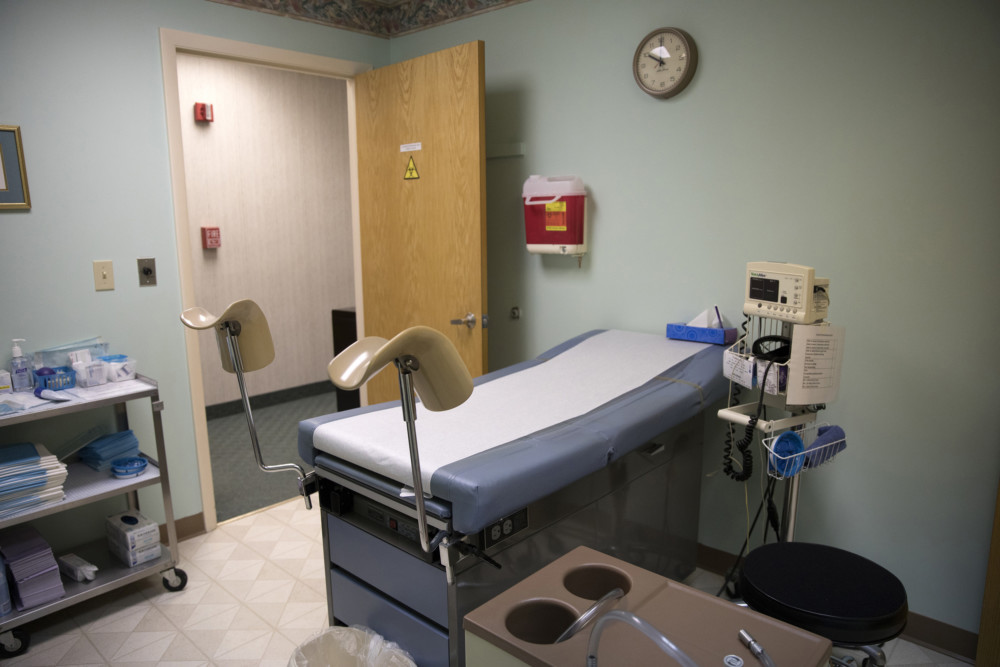By Jack Suntrup
St. Louis Post-Dispatch
WWR Article Summary (tl;dr) The pelvic exam requirement is the latest flashpoint over abortion regulations in Missouri.
JEFFERSON CITY, Mo.
Enforcement of a rule requiring women to have a pelvic exam before receiving a pill abortion is sending Missouri’s Planned Parenthood patients to Illinois.
Dr. David Eisenberg, medical director at Planned Parenthood in the Central West End, said he tells his patients: “If you stay here, you have to wait three days to come back and see me, and have a pelvic exam performed, or you can choose to go elsewhere, like Illinois.’ And 100 percent of the patients that I’ve had that conversation with to date have chosen to go to Illinois.”
The pelvic exam requirement is the latest flashpoint over abortion regulations in Missouri. The state Department of Health and Senior Services and GOP lawmakers argue generally that the state’s requirements, ranging from requiring doctors to have admitting privileges at hospitals to a suite of new rules approved last year, are designed to protect the health and safety of women. Abortion-rights advocates describe such rules as not-so-veiled attempts at making abortion unfeasible through regulation.
State regulations have long required pelvic exams prior to abortions, but Eisenberg said the rules have not been updated to reflect the growth of abortions by medication, which are non-surgical and are completed at home.
Even though pelvic exams were technically required for all abortions, Eisenberg said, the state had not cited Planned Parenthood for omitting the exams prior to medication abortions.
“They understood the reasoning and we were not cited for it,” Eisenberg said of state inspectors. “I would say they agreed with me.”
That changed in March, Eisenberg said, when the DHSS cited Reproductive Health Services of Planned Parenthood of the St. Louis Region for not complying with the pelvic exam requirement.
Dr. Randall Williams, director of the DHSS and a board certified obstetrician, said that on June 18 the department denied Planned Parenthood’s request for an exemption to the pelvic exam requirement when it came to medication abortions.
“Pelvic exams are very much a part of standard care for women receiving gynecological services,” Williams told the Post-Dispatch. “We think that our job is to ensure the safety of women undergoing these procedures.”
But the stance puts the state at odds with guidance from the American College of Obstetricians and Gynecologists, or ACOG, which does not recommend requiring pelvic exams prior to medication abortions. The group says pelvic exams are medically unnecessary prior to medication abortions in most cases.
“Any decision to perform a pelvic exam should include a discussion of the potential benefits and risks, and emphasize shared decision making between a patient and provider, patient understanding and consent to the procedure are paramount,” a statement from ACOG, drawn from its pelvic exam guidance, said.
Alison Dreith, executive director of NARAL Pro-Choice Missouri, wrote last year in the Riverfront Times about traveling to Illinois to receive a medication abortion because of Missouri’s 72-hour waiting period.
“As a patient who has had a medicated abortion, I would be very leery of the state, of any state, mandating a pelvic exam when it’s medically unnecessary,” Dreith said. “To me, that’s a form of state-sanctioned sexual assault.”
Not so, said Williams, who has acted as the state’s expert witness in defense of some of its regulations.
“We think that our job is to ensure the safety of women undergoing these procedures,” Williams said, ” … and we think part of that is doing a pelvic exam prior to the procedure, whether it be medical or surgical, as good, standard medical practice.”
The St. Louis Planned Parenthood location on Forest Park Avenue is the only abortion provider in Missouri. The nearest provider in Illinois is Planned Parenthood’s Fairview Heights location, about 15 miles away.
The Illinois Department of Public Health has not released abortion figures for 2018, so any jump in out-of-state patients because of the pelvic exam requirement would not be reflected in the latest data available.
But Illinois clinics have seen more abortions performed on out-of-state patients in recent years, state figures show. Last year, providers reported 5,528 abortions performed on out-of-state patients, up from 4,543 in 2016 and 3,210 the year before, according to the Illinois Department of Public Health.
Julie Lynn, a spokeswoman for Planned Parenthood of Illinois, said one of the reasons for the increase in out-of-state patients could be because few abortion clinics exist in neighboring states such as Iowa, Missouri and Wisconsin.
She said the number of out-of-state abortions could be artificially inflated, however, because the number of women whose state is reported as “unknown” has decreased in recent years. Some women could also carry an out-of-state ID but live in Illinois.
Still, Lynn said, “Many states surrounding Illinois have barriers and restrictions on abortion services that make accessing an abortion very difficult.”














































































































































































































































































































































































